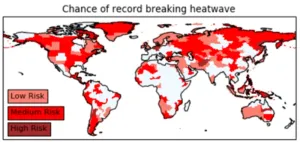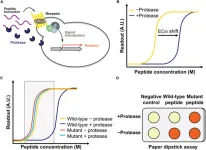(Press-News.org) A new study has highlighted under-prepared regions across the world most at risk of the devastating effects of scorching temperatures.
The University of Bristol-led research, published today in Nature Communications, shows that unprecedented heat extremes combined with socioeconomic vulnerability puts certain regions, such as Afghanistan, Papua New Guinea, and Central America, most in peril.
Countries yet to experience the most intense heatwaves are often especially susceptible, as adaptation measures are often only introduced after the event. A high chance of record-breaking temperatures, growing populations, and limited healthcare and energy provision, increase the risks.
Beijing and Central Europe are also on the list of hotspots, as if record-breaking heatwaves occurred in these densely populated regions millions of people would be adversely affected.
In light of the findings, the researchers are calling for policy makers in hotspot regions to consider relevant action plans to reduce the risk of deaths and associated harms from climate extremes.
Lead author, climate scientist Dr Vikki Thompson at the University of Bristol Cabot Institute for the Environment, said: “As heatwaves are occurring more often we need to be better prepared. We identify regions that may have been lucky so far – some of these regions have rapidly growing populations, some are developing nations, some are already very hot. We need to ask if the heat action plans for these areas are sufficient.”
The researchers used extreme value statistics — a method to estimate the return periods of rare events — and large datasets from climate models and observations to pinpoint regions globally where temperature records are most likely to be broken soonest and the communities consequently in greatest danger of experiencing extreme heat.
The researchers also cautioned that statistically implausible extremes, when current records are broken by margins that seemed impossible until they occurred, could happen anywhere. These unlikely events were found to have transpired in almost a third (31%) of the regions assessed where observations were deemed reliable enough between 1959 and 2021, such as the 2021 Western North America heatwave.
Co-author Dann Mitchell, Professor in Atmospheric Sciences at the University of Bristol Cabot Institute for the Environment, said: “Being prepared saves lives. We have seen some of the most unexpected heatwaves around the world lead to heat-related deaths in the tens of thousands. In this study, we show that such record smashing events could occur anywhere. Governments around the world need to be prepared.”
Human-induced climate change is causing an increase in the frequency, intensity, and duration of heatwaves, which have the potential to lead to thousands more excess deaths globally.
Improving our understanding of where society may not be ready for climate extremes can help prioritise mitigation in the most vulnerable regions. In recognition of the dangerous consequences of climate change, evidenced by the work of its climate experts, in 2019 the University of Bristol became the first UK university to declare a climate emergency.
Paper
‘The most at-risk regions in the world for high-impact heatwaves’ by V. Thompson, D. Mitchell, G. Hegerl, M. Collins, N. Leach, and J. Slingo in Nature Communications
END
Global research reveals countries where record-breaking heatwaves are likely to cause most harm
2023-04-25
ELSE PRESS RELEASES FROM THIS DATE:
Using artificial intelligence to create a tsunami early warning system
2023-04-25
Cardiff University media release/Datganiad i’r wasg gan Brifysgol Caerdydd
Under embargo until 16:00 BST/11:00 EST on Tuesday 25 April 2023/O dan embargo tan 16:00 BST/11:00 EST ddydd Mawrth 25 Ebrill 2023
Using artificial intelligence to create a tsunami early warning system
Real-time classification of underwater earthquakes enables earlier and more reliable tsunami alerts
An early warning system that quickly classifies submarine earthquakes and determines the risk of tsunami events has been developed by scientists at Cardiff ...
Researchers at Albert Einstein College of Medicine discover how long-lasting memories form in the brain
2023-04-25
April 25, 2023—(BRONX NY)—Helping your mother make pancakes when you were three…riding your bike without training wheels…your first romantic kiss: How do we retain vivid memories of long-ago events? As described in a paper published online on April 25 in Neuron, researchers at Albert Einstein College of Medicine have found the explanation.
“The ability to learn new information and store it for long periods is one of the brain’s most remarkable features,” said Robert H. Singer, Ph.D., ...
Researchers find rhythmic brain activity helps to maintain temporary memories
2023-04-25
New research shows that rhythmic brain activity is key to temporarily maintaining important information in memory. Researchers at the Del Monte Institute for Neuroscience at the University of Rochester published these findings today in Current Biology that found brain rhythms—or patterns of neuronal activity—organize the bursts of activity in the brain that maintain short-term connections.
“The thought has been that the temporary storage of important information is linked to neurons in the brain that just fire away, retaining that information until it is no longer needed. Recent research has shown that it might not be such persistent ...
Near-universal T cell immunity towards a broad range of bacteria
2023-04-25
Typically T cells of the immune system respond to a specific feature (antigen) of a microbe, thereby generating protective immunity. As reported in the journal Immunity, an international team of scientists have discovered an exception to this rule. Namely, a group of divergent bacterial pathogens, including pneumococci, all share a small highly conserved protein sequence, which is both presented and recognized by human T cells in a conserved population-wide manner.
The study set out to understand immune mechanisms that protect against pneumococcus, a bacterial pathobiont that can reside harmlessly in the upper respiratory mucosae but can also cause infectious ...
Novel living yeast-based dual biosensor for detecting peptide variants
2023-04-25
Biosensors—sensors that can detect biological samples—are powerful tools for understanding the function, composition, and structure of biochemical molecules. Biosensors are often applied for the detection of proteins and their subunits, called peptides, yielding a wide range of biomedical applications. In 2017, researchers from Columbia University in USA engineered a living yeast biosensor by rewiring pheromone-related signaling pathways used by yeast for mating. In the presence of the pheromone peptide, the G-protein coupled receptor (GPCR) could detect the peptide, triggering a cascade that would eventually activate a ...
Sizing them up! An algorithm to accurately quantify rapeseed silique morphology
2023-04-25
Rapeseed or oilseed rape (Brassica napus L.) is an important crop cultivated worldwide for its oil-rich seeds. The rapeseed silique is an organ that plays a role in photosynthesis, sends developmental signals to maturing seeds, and provides a capsule that harbors the seeds. High-yield rapeseed varieties have both a high number and optimal morphology–the form and structure–of siliques. In this regard, rapeseed genotype and cultivation method directly influence the number of siliques that a plant produces. Thus, accurately quantifying silique development parameters is critical for predicting ...
Columbia University launches Center for Precision Psychiatry & Mental Health with $75 million grant from the Stavros Niarchos Foundation
2023-04-25
NEW YORK, April 24, 2023—Columbia University today announced the establishment of the Stavros Niarchos Foundation (SNF) Center for Precision Psychiatry & Mental Health at Columbia University. The center will catalyze the scientific innovation and clinical implementation of precision medicine to advance the prevention, diagnosis, and treatment of mental illness. The center is being established with a $75 million grant from the Stavros Niarchos Foundation (SNF), an international philanthropic organization, as part of SNF’s Global Health Initiative (GHI).
The SNF Center is a joint effort of the Department of Psychiatry at Columbia University Vagelos College of Physicians ...
Research links common insecticide to neurodevelopmental disorders
2023-04-25
A new study from The University of Toledo suggests early exposure to a common class of insecticides called pyrethroids may increase the risk of autism and other developmental disorders, even at levels currently recognized as safe by federal regulators.
The findings, which come from a study of mice, were published today in the peer-reviewed journal PNAS Nexus.
Pyrethroids are some of the most widely used insecticides in the country, appearing in both consumer products and industrial preparations.
“If ...
New research sheds light on how to choose quality eHealth tools
2023-04-25
With so many eHealth tools available, it can be challenging to select the best one for a specific health need. A recent study published in JMIR Human Factors provides valuable insights on how to choose quality eHealth tools in an evolving landscape of digital health technology. This study titled “Assessing the Quality and Impact of eHealth Tools: Systematic Literature Review and Narrative Synthesis” comprehensively examined how the quality and impact of eHealth tools are currently assessed.
Led by Dr Christine Jacob, a health tech researcher at the University of Applied Sciences and Arts Northwestern ...
SwRI tests automated vehicles in virtual off-road environments
2023-04-25
SAN ANTONIO – April 25, 2023 – Southwest Research Institute (SwRI) has created a 3D simulation tool to test automated vehicles in virtual off-road environments modeled after real-world conditions. The research expands SwRI’s investment into software-in-the-loop solutions to test connected and automated vehicles (CAVs) in scenarios ranging from congested roadways to off-road terrain. A simulated environment, or a 3D “software loop,” supports evaluations of an infinite number of scenarios that would be cost-prohibitive to test in the real world.
The technology meets U.S. Department of Defense demands ...








